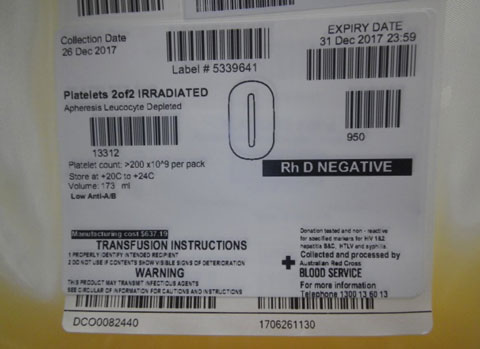The Blood Service is introducing a new automated screening test to improve access to clinical plasma components and apheresis platelets with low titre anti-A and/or anti-B. All plasma rich blood components containing a high titre of anti-A and/or anti-B antibodies pose a risk of causing clinically significant haemolysis when transfused to ABO incompatible recipients. Historically, this testing has been performed manually and limited to group O apheresis platelet components.
Due to limited inventory of platelets and their short expiry or the need for human leucocyte antigen (HLA) matching, ABO incompatible platelets may be the only component available for transfusion. The relatively large volume of plasma in apheresis platelets poses an increased risk of haemolysis due to anti-A and/or anti-B. This risk may be reduced by using components that are known to have low titre of anti-A and/or anti-B.
In an emergency, group AB plasma components are recommended where the patient’s blood group is unknown because these products contain no anti-A or anti-B. However, with less than four per cent of the Australian population being group AB, and limiting the source of clinical plasma components to only male donors to reduce the risk of transfusion-related acute lung injury (TRALI), it is challenging to maintain sufficient inventory of group AB clinical plasma components. Group A plasma components may be used as an alternative to AB provided the component is not known to have a high titre anti-B (Australian and New Zealand Society of Blood Transfusion, Guidelines for Transfusion and Immunohaematology Laboratory Practice, 1st Edition, November 2016). However, the Blood Service has not previously screened for high titre anti-A and/or anti-B in clinical plasma components. This new automated screening test will enable all clinical plasma components to be tested.
Where testing indicates a low titre of anti-A and/or anti-B, the clinical plasma components and apheresis platelets will have a modifier, “Low Anti-A/B”, printed on the release label to enable selection of these components where there is a need to cross ABO blood groups. The modifier will not be applied to group AB components as these donations do not have anti-A or anti-B.
This change will occur from 19 March 2018 and will improve access to low titre anti-A/B clinical plasma components and apheresis platelets, reducing the risk of potential associated transfusion reactions.

